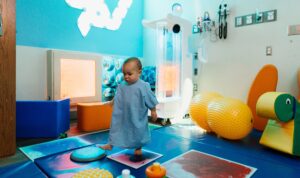Human Understanding inspires PX Champs, best practices, and a culture of compliments
Check out the Q3 snapshots highlighting how we put Human Understanding® into practice.
How UCHealth champions patient experience
Echo Vogel, Patient Experience Director for UCHealth’s Southern Colorado region, is much like the titular character in the children’s book The Little Engine That Could. The story about a female underdog who achieves the most unlikely of victories is a metaphor for determination—and Vogel’s story shows how her optimism and hard work paid off to launch UCHealth’s Patient Experience Champions program. UCHealth boasts more than 600 Champions throughout its system, about one for every 50 employees—a remarkable feat.
“We can talk about joy in work, and our patients feel it,” says Windie Her, Patient Experience Manager for UCHealth’s Metro Denver region. “And now, here are patient comments from NRC surveys saying that when we have joy in work, we have a stronger team, and our patients see that.”
The concept of the UCHealth Patient Experience Champions Program was to find employees who could be role models for patient experience and were committed to creating a positive ripple effect within the organization.
Find out more about the UCHealth Champions Program’s goal and objectives, application process, and ideal Champion profile; how they facilitate their monthly meetings; and their patient feedback system and success stories!
NRC Health’s Human Understanding Beyond | HUB23 inspires and invigorates in Boston
NRC Health’s HUB23 conference in Boston brought together hundreds of the best hearts and minds in healthcare to share proven best practices, emerging trends, and forward-thinking innovations. HUB23’s leading healthcare organizations, industry leaders, and innovators strategized around improving experiences for patients, providers, care teams, and health systems with a human-centered approach.
“Hospitals and health systems have needed to adjust at warp speed in recent years,” said Helen Hrdy, Chief Growth Officer at NRC Health. “We commend everyone for building and sustaining consumer loyalty through individualized care during unprecedented times.”
See HUB23 in action and mark your calendars now for HUB24 in sunny San Diego!
How to build loyalty into each patient experience
The pandemic affected how communities perceive healthcare organizations, leading to delayed care and a growing distrust of health systems.
During July’s Becker’s Hospital Review podcast, two prominent healthcare leaders discussed what health systems can do to build long-lasting patient loyalty. John Berg, Marketing Director and Assistant Vice President of the University of Florida Health, and Ryan Donohue, strategic advisor at NRC Health, believe healthcare organizations must restore patient trust and loyalty, starting with differentiating their brands in the marketplace.
“We’re seeing brands lumped together in consumers’ minds in our Market Insights data,” says Donohue. “Almost half of consumers said they heard the same messages from all the same health systems—we’re calling it the brand blur. We’re seeing a lot less cynicism in data among consumers and patients, but there is work to do.”
 Dayton Children’s uses innovative sensory tools to humanize pediatric surgery
Dayton Children’s uses innovative sensory tools to humanize pediatric surgery
Surgery can easily frighten any child or parent but can be additionally traumatic for children with special needs. A team at Dayton Children’s, led by pediatric anesthesiologist Sean Antosh, MD, believed there was a better way to humanize care and environments for patients, particularly for children with Autism Spectrum Disorder or other special needs like ADHD or high anxiety.
Some of the tools the Dayton Children’s sensory rooms use include a sensory rover that includes fiber optics that appeal to touch or a water feature that appeals to sight, projectors that can display a child’s favorite calming images, silence and low lighting, colored mood lighting, or fidget objects for hyperactive children, among other features.
The results? Since the start of the sensory program in 2017, the experience has helped reduce the percentage of patients who require pre-surgery calming medicine from 90% to 20%. The 20% who still need medication can be given it in an easier format for families, like fluid medication instead of intramuscular medications. (Previously, many special-needs patients needed to be held down before a shot could be administered.) Antosh says this new change has been remarkable for the hospital’s patients and families, who have never had different options before.
Spencer Hospital’s compliment culture boosts team connections and improves morale
Spencer Hospital believes that everyone is healthier together.
A Top 100 Rural & Community Hospital offering comprehensive and high-quality healthcare services to the people of northwest Iowa and southern Minnesota, Spencer Hospital believes that connection is the heartbeat of its positive workforce culture.
Establishing a positive organizational culture where employees and managers support one another is a top priority for Spencer Hospital. They embrace Human Understanding by creating a culture of gratitude that expresses praise to keep up morale. Positive feedback has been shown to mitigate the negative effects of stress on employee performance and increase staff retention.
“It really starts with our employees and coworkers, and we want to have a positive culture for them,” says Becky Stoltz, the hospital’s Director of Quality Services. “I think sharing patient compliments and praising them for the good work they do caring for our patients is just one way we can support them.”
Discover how Spencer Hospital uses NRC Health’s Compliment Sharing, a scalable tool that makes it easy to show patient appreciation by automatically identifying positive feedback and empowering organizations to build positive workforce engagement.


